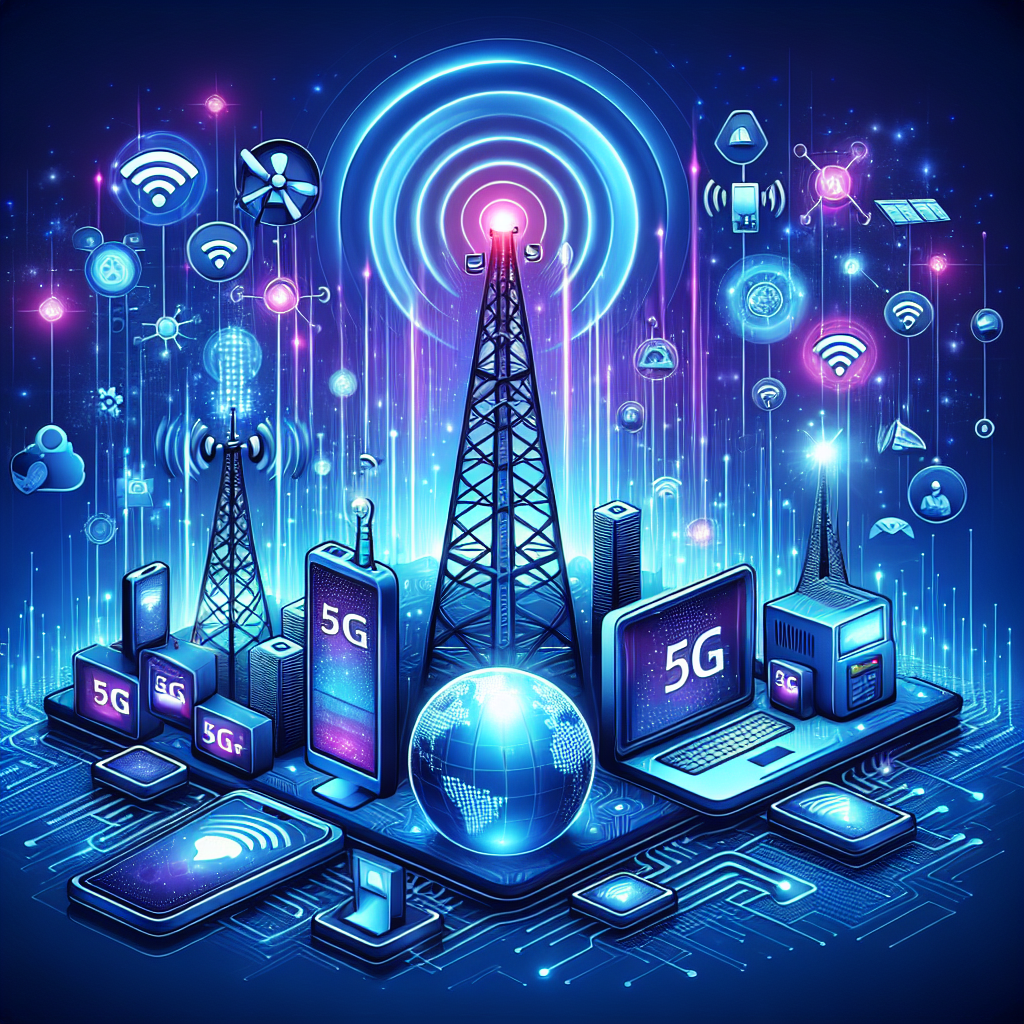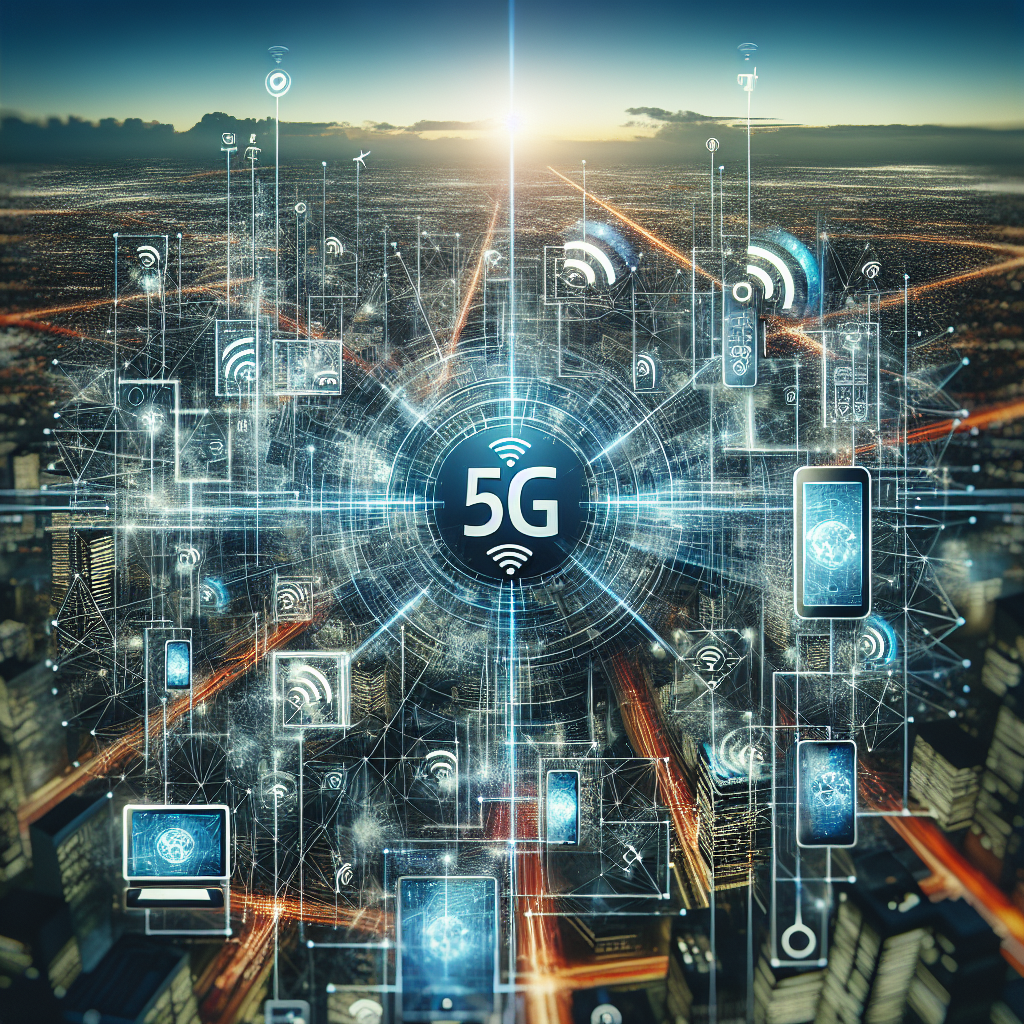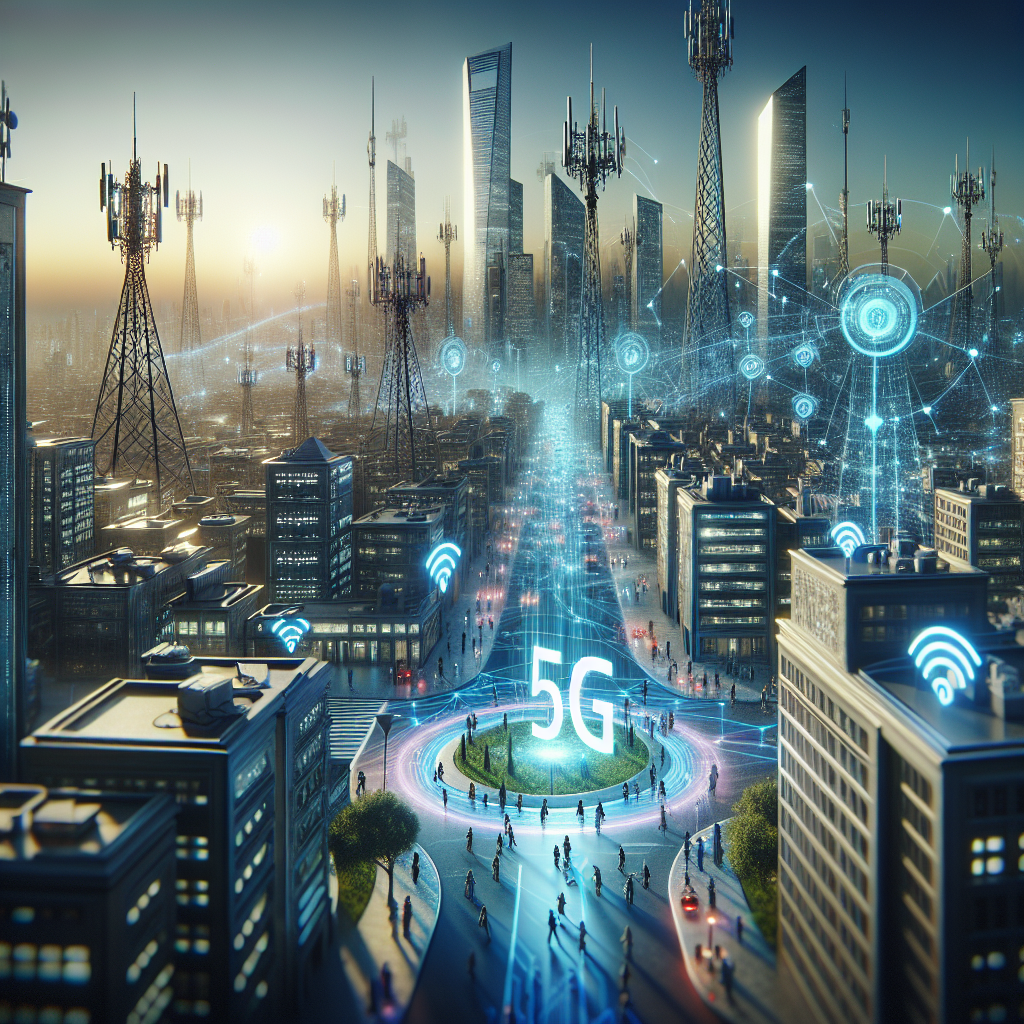In today’s fast-paced world, staying connected has never been more crucial. With the emergence of 5G technology, internet service plans now offer lightning-fast speeds and unparalleled connectivity. This groundbreaking development in telecommunications is set to revolutionize the way we experience the internet, making laggy connections and buffering a thing of the past. Internet service providers are now rolling out a range of 5G coverage plans, promising seamless streaming, speedy downloads, and enhanced browsing experiences. Join us as we navigate the future of connectivity with these cutting-edge internet service plans that will undoubtedly shape the way we interact with the digital world.
Understanding 5G Technology
-
What is 5G?
5G stands for the fifth generation of wireless technology, representing a significant leap forward in terms of speed, capacity, and connectivity. It is designed to provide faster data speeds, lower latency, and increased capacity to support the growing number of connected devices in our increasingly digital world.
-
How does 5G differ from previous generations?
5G differs from its predecessors, such as 4G LTE, primarily in terms of speed, latency, and capacity. With 5G, users can experience download speeds up to 100 times faster than 4G, significantly reduced latency for real-time applications like gaming and video streaming, and the ability to connect a much larger number of devices simultaneously without sacrificing performance.
-
Benefits of 5G technology
- Enhanced speed: 5G technology offers blazing-fast download and upload speeds, making activities like streaming high-definition content, video conferencing, and online gaming smoother and more seamless.
- Lower latency: With reduced latency in the single-digit milliseconds range, 5G enables real-time interactions and applications, opening up possibilities for technologies like autonomous vehicles, remote surgery, and augmented reality.
- Increased capacity: The higher capacity of 5G networks allows for more devices to connect simultaneously without experiencing network congestion, ensuring a consistent and reliable user experience even in densely populated areas.
- Innovative applications: The capabilities of 5G technology are driving innovation across various industries, including healthcare, manufacturing, transportation, and entertainment, enabling the development of new services and solutions that were previously not feasible with older network technologies.
Evolution of Internet Service Plans
Over the years, internet service plans have undergone significant evolution to keep up with the increasing demands of users for faster and more reliable connectivity. Understanding the evolution of these plans provides valuable insights into the current landscape of internet services.
-
Traditional internet service plans
In the past, traditional internet service plans were primarily based on wired connections such as DSL or cable. These plans offered limited speeds and were often plagued by issues such as latency and network congestion. Users had to rely on physical infrastructure to access the internet, which restricted mobility and flexibility.
-
Introduction of 5G in internet service plans
The introduction of 5G technology revolutionized the internet service industry by offering unparalleled speed and reliability. 5G networks utilize higher frequency radio waves, enabling faster data transfer rates and lower latency. Internet service providers began incorporating 5G technology into their plans to provide customers with seamless connectivity both at home and on the go.
-
Impact of 5G on internet speed and reliability
With 5G coverage, internet service plans now offer blazing-fast speeds that rival traditional wired connections. Users can enjoy smooth streaming, quick downloads, and lag-free online gaming experiences. The reliability of 5G networks ensures consistent performance even in densely populated areas where network congestion is common. Overall, the integration of 5G into internet service plans has set a new standard for connectivity, paving the way for a future where high-speed internet is more accessible and efficient than ever before.
Major Players in 5G Internet Service

– Telecom companies offering 5G internet service plans
Leading telecom companies at the forefront of providing 5G internet service plans include industry giants such as Verizon, AT&T, T-Mobile, and Sprint. These companies have invested heavily in developing their 5G networks to offer high-speed internet connectivity to their customers. Verizon, known for its extensive coverage and fast speeds, has been a pioneer in rolling out 5G services in various cities across the United States. AT&T also boasts a robust 5G network, aiming to deliver next-generation connectivity to both urban and rural areas. T-Mobile and Sprint have joined forces to enhance their 5G offerings, promising improved coverage and faster speeds for their subscribers.
- Comparison of 5G plans among different providers
When comparing 5G plans among different providers, factors such as coverage area, network speed, pricing, and additional features play a crucial role in helping consumers make informed decisions. Verizon’s 5G plans are known for their widespread coverage in urban centers and reliable performance, albeit at a premium price point. AT&T offers competitive 5G plans with a focus on speed and low latency, catering to users who prioritize fast and stable internet connections. T-Mobile and Sprint’s merger has led to the expansion of their 5G network, providing customers with more options for affordable plans with decent coverage and speeds.
- Customer reviews and satisfaction ratings
Customer reviews and satisfaction ratings offer valuable insights into the real-world performance of 5G internet service plans provided by different telecom companies. By analyzing feedback from subscribers, potential customers can gauge factors such as network reliability, customer service quality, and overall satisfaction levels. Positive reviews often highlight fast speeds, seamless connectivity, and responsive customer support as key strengths of a particular provider’s 5G service. On the other hand, negative reviews may point out issues such as network congestion, coverage gaps, or billing discrepancies that can impact the overall user experience.
Factors to Consider When Choosing a 5G Internet Service Plan
When selecting a 5G internet service plan, several crucial factors should be taken into consideration to ensure that you are getting the best connectivity experience possible. Here are some key aspects to keep in mind:
-
Coverage area of 5G network
It is essential to assess the coverage area of the 5G network provided by the internet service plan. Make sure that the 5G network covers the areas where you typically use your devices to guarantee seamless connectivity. Check coverage maps provided by the service provider to determine the availability of 5G in your region.
-
Speed and bandwidth offered in the plan
The speed and bandwidth offered in the 5G internet service plan can significantly impact your online activities. Consider your usage patterns, such as streaming, gaming, or video conferencing, and choose a plan that provides adequate speeds and bandwidth to support these activities without interruptions. Higher speeds and larger bandwidth allocations can ensure smoother and faster connectivity.
-
Pricing and contract terms
Evaluate the pricing structure and contract terms of the 5G internet service plan to determine its affordability and flexibility. Compare the costs of different plans offered by various providers and take note of any promotional offers or discounts that may be available. Additionally, review the contract terms, including the length of the agreement, early termination fees, and any hidden charges to make an informed decision.
-
Additional features and benefits
Look into the additional features and benefits included in the 5G internet service plan to enhance your connectivity experience further. Some plans may offer perks such as unlimited data, access to premium streaming services, security features, or customer support options. Assess these extras to identify the plan that best aligns with your needs and preferences.

Common Misconceptions about 5G Internet Service Plans
-
Health concerns related to 5G technology
- One common misconception surrounding 5G internet service plans is the belief that 5G technology poses significant health risks to individuals. However, numerous scientific studies have been conducted to assess the safety of 5G networks, and regulatory bodies such as the FCC have set guidelines to ensure that exposure levels are well below established safety limits.
- Despite some public apprehension, there is currently no conclusive evidence to suggest that 5G technology directly causes adverse health effects.
-
Misunderstandings about the impact of 5G on existing devices
- Another prevalent misconception is the notion that 5G networks will render existing devices obsolete or incompatible. In reality, while 5G technology may offer enhanced performance on devices designed to leverage its capabilities, it is backward compatible with 4G LTE networks, ensuring that older devices can still connect and function effectively.
- It is essential to note that the rollout of 5G networks is a gradual process, allowing users time to transition to newer devices that can take full advantage of the technology.
-
Addressing myths about 5G network security
- There are concerns among some individuals regarding the security implications of 5G networks, with fears of increased vulnerability to cyber threats and privacy breaches. However, network operators and technology companies are actively working to address these concerns by implementing robust security protocols and encryption measures to safeguard data transmitted over 5G networks.

- While no network is entirely immune to security risks, the industry is continuously evolving to enhance security standards and protect users’ information in the age of 5G connectivity.
- There are concerns among some individuals regarding the security implications of 5G networks, with fears of increased vulnerability to cyber threats and privacy breaches. However, network operators and technology companies are actively working to address these concerns by implementing robust security protocols and encryption measures to safeguard data transmitted over 5G networks.
Future Trends and Innovations in 5G Internet Service
Integration of 5G with Emerging Technologies like IoT and AI
- 5G and IoT Integration: The future of 5G internet service plans will see a seamless integration with Internet of Things (IoT) devices. With the ultra-low latency and high data speeds of 5G networks, IoT devices will be able to communicate faster and more efficiently, leading to the proliferation of smart homes, cities, and industries.
- 5G and AI Synergy: Another key trend in the future of 5G internet service is the synergy with Artificial Intelligence (AI). The high bandwidth and reliability of 5G networks will enable AI applications to process and analyze vast amounts of data in real-time, revolutionizing industries such as healthcare, autonomous vehicles, and logistics.
- Enhanced Connectivity for Smart Devices: As 5G networks continue to expand, the connectivity of smart devices will become more robust and reliable. This will lead to a more interconnected ecosystem where devices can communicate seamlessly, paving the way for innovative services and applications.
Potential Advancements in 5G Network Infrastructure
- Virtualization and Network Slicing: One of the key advancements in 5G network infrastructure is the implementation of virtualization and network slicing. This technology allows service providers to allocate specific network resources to different users or applications, optimizing network performance and ensuring a consistent quality of service.
- Massive MIMO and Beamforming: With the deployment of Massive Multiple-Input Multiple-Output (MIMO) and beamforming technologies, 5G networks will be able to support a larger number of devices simultaneously while maintaining high data speeds and reducing interference. This will be crucial for supporting the increasing number of connected devices and applications in the future.
- Edge Computing: Another potential advancement in 5G network infrastructure is the integration of edge computing capabilities. By bringing computing resources closer to the end-users, edge computing can reduce latency and improve the overall performance of applications and services running on 5G networks.
FAQs: Internet Service Plans with 5G Coverage: Navigating the Future of Connectivity
What is 5G coverage and how does it differ from 4G?
5G coverage refers to the fifth generation of mobile network technology, offering faster speeds, lower latency, and increased capacity compared to 4G. With 5G, users can experience higher download and upload speeds, improved network reliability, and better connectivity for devices such as smartphones, tablets, and IoT devices.
What are the benefits of choosing an internet service plan with 5G coverage?
Internet service plans with 5G coverage offer users the ability to take advantage of faster speeds and lower latency, enabling smoother streaming, faster downloads, and better overall online experiences. Additionally, 5G coverage can provide more reliable connectivity, especially in densely populated areas or areas with high network congestion.
How do I know if my area is covered by 5G?
Most major internet service providers offer coverage maps on their websites where users can check the availability of 5G in their area. Alternatively, users can contact their service provider directly to inquire about 5G coverage in their specific location. Keep in mind that 5G coverage is still being expanded, so it may not be available in all areas yet.
Are there any drawbacks to choosing an internet service plan with 5G coverage?
While internet service plans with 5G coverage offer numerous benefits, there are some potential drawbacks to consider. For example, 5G coverage may not be as widespread as 4G coverage, especially in rural or remote areas. Additionally, some users may experience higher costs associated with 5G plans compared to traditional 4G plans.
How can I choose the best internet service plan with 5G coverage for my needs?
When choosing an internet service plan with 5G coverage, it’s important to consider factors such as coverage availability in your area, data speeds and limits, pricing, contract terms, and any additional features or perks offered by the provider. Researching and comparing different plans from various providers can help you find the best option that meets your connectivity needs and budget.


